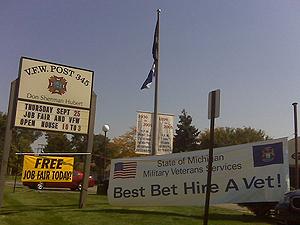Veterans struggle in tough job market
Veterans Job Fair in Redford, MI (Image by Flickr user MichiganMoves (CC: by-nc-sa))
This story is adapted from a broadcast audio segment; use audio player to listen to story in its entirety.
Story by Kirk Carapezza, PRI’s “The World”
At Fort McCoy in southwester Wisconsin, more than 300 soldiers file past the barbed wire perimeter and enter the military headquarters building. Fresh from duty in Iraq, the soldiers of the 32nd Infantry Brigade Unit are sunburned and tired. They’ll stay here at the sprawling military training center for five days, demobilizing. That involves sitting through seemingly endless briefings covering everything from marriage counseling to coping with stress disorders, and finding employment.
Rick Larson, a retired Army Officer who leads the briefing on finding work, addresses a group of soldiers.
“As you know with the economy, it’s hard out there. So I’m not going to try to blow smoke. How many people here will be looking for jobs when they go back to their home?”
About half the soldiers raise their hands, including 24-year-old Sergeant Lee Jones. Jones was a high school senior when the war in Iraq began. Over the last four years, he’s been deployed three times, working his way up to Special Operations in the Army National Guard and Reserves.
He says his time in the service has taught him about leadership and discipline, but coming home and looking for work is like having been stuck on a deserted island. “Everyone’s moved on, but you seem to have been in the same place the entire time.”
The US Bureau of Labor Statistics says in 2009, veterans 24 years old and younger had an unemployment rate of roughly 27 percent, about 10 percent higher than civilians of the same age group.
Ken Grant with the Wisconsin Department of Workforce Development says it’s party because some employers simply won’t hire a veteran.
“Let’s face it, you know having the guard and reserve soldiers on multiple deployments and then taking them away from that employer, that does hurt them,” said Grant.
Grant adds that even when young vets do get jobs, many of them find their positions difficult to keep in this economy.
“The younger person is the first one to let go from a factor or a closing. They don’t have the experience or the seniority, so they would be the first ones out the door. We’re a heavy manufacturing state, such as the auto industry, these employers have closed their doors.”
This makes it difficult for young veterans and reservists like Raymond Lynch. The 23-year-old signed up for the Army in 2003, has been deployed to Baghdad two times since then, and was laid off from a landscaping job last year, three months before his most recent deployment.
“They usually lay off anyways in the winter,” said Lynch. “But they had to do it a couple of months short … just because there wasn’t much money coming in for landscaping because of the economy.”
Lynch says he’s planning to ride out the recession by going back to school, though he’s not sure for what.
“At one time I wanted to be a teacher. One time I wanted to be a psychologist. Now I don’t know.”
During a short break in the briefings at Fort McCoy, Sergeant Lee Jones listens as another veteran’s representative talks about finding a job.
“The process can be as simple as you get referred to a job, you go down, you interview, you kill the interview, you’re ready to go,” said the representative. “Or, it can be more time consuming and we need to do more things to make you job ready.”
Jones says he’d like a law enforcement or security job. Something, he says, that has a rigid structure outside the barbed wire.
But Jones says he’s getting married in the spring and will take any job he can find. “I would like to be somewhere where it’s a self-worth job; not a job where I feel stuck, and right now with getting married and everything, it’s crucial to have paycheck.”
To help these young veterans to adjust and find that elusive paycheck in a jobless recovery, labor officials say they’re planning additional job fairs specifically targeting veterans late this year.
PRI’s “The World” is a one-hour, weekday radio news magazine offering a mix of news, features, interviews, and music from around the globe. “The World” is a co-production of the BBC World Service, PRI and WGBH Boston. More “The World.”
Every day, reporters and producers at The World are hard at work bringing you human-centered news from across the globe. But we can’t do it without you. We need your support to ensure we can continue this work for another year.
Make a gift today, and you’ll help us unlock a matching gift of $67,000!
